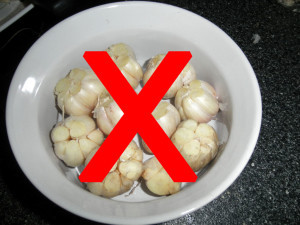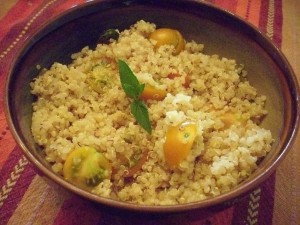Over the past few years, the low FODMAP diet is getting some good press. There’s a growing amount of research supporting it for people with tummy troubles of all sorts, especially IBS or IBD (Crohn’s, Ulcerative Colitis) and SIBO (Small Intestinal Bacterial Overgrowth). Reducing these FODMAPs help about 75% of people with IBS problems. Obviously, this is a major help for many people who experience ongoing gastrointestinal distress.
But what’s a FODMAP, anyhow? FODMAP is acronym abbreviation for Fermentable Oligosaccarides, Disaccarides, Monosaccarides and Polyols. Unless you’re a food scientist, that likely means very little. In a nutshell, FODMAPs are carbs that certain people have trouble digesting, so they ferment in the gut and can cause all sorts of obnoxious symptoms, like gas, bloating, diarrhea, cramping, abdominal pain and even constipation. Many different kinds of foods are high in FODMAPs, such as wheat, beans, garlic and onions, and many kinds of fruits and veggies.
Wait, wait, what? So now fruit, garlic and beans are bad for you? Thankfully, no. Foods with FODMAPs are not “bad” or unhealthy foods, just foods that can provoke symptoms in some people. For people without digestive distress, FODMAPs may feed good bacteria and support overall health. A low FODMAP diet is an elimination diet designed for GI symptom management, rather than something that’s globally healthier for everyone. Once people start feeling better, it’s all about adding foods back and making the diet as wide and varied as possible.
When I first started teaching the low FODMAP diet years ago, I was dubious, because it is a lot of work. The good news is I’ve been amazed and delighted at how much a low FODMAP diet helps reduce symptoms in clients I’ve worked with. Interestingly, studies have suggested that some people with stomach issues that have learned over time that they are gluten sensitive actually respond more fully to a low FODMAP diet than just a gluten-free diet. There’s speculation that for some, the key problematic component in wheat isn’t really gluten, but a fermentable carb called fructans. And of course, the research is still underway.
How it works: we do an elimination diet where the main sources of FODMAPs are eliminated, and that means eating “allowed” foods in allowed amounts for a few weeks. Most people notice significant improvement, even in the first week or two. Then we begin a structured reintroduction to see which classes or kinds of FODMAPs are actually triggering a reaction. The goal at the end of the day, of course, is to minimize symptoms while keeping as many foods on the table as possible.
One word of caution–between the complexity foods allowed and disallowed, the quantity and spacing and the many incomplete lists on the Internet, I often find people have spent a lot of time and energy trying to follow the diet and either miss something important or overly restrict. I’d definitely recommend getting support from someone who works extensively with the low FODMAP diet.
There are a couple of great books & resources to get you started:
- IBS Free at Last (2nd edition) by Patsy Catsos, MS, RD
- The Complete Low-FODMAP Diet: A Revolutionary Plan for Managing IBS and Other Digestive Disorders by Sue Shepherd, PhD, RD and Peter Gibson, MD
- Flavor without FODMAPs: Love the foods that love you back, by Patsy Catsos, MS, RD
- Kate Scarlata’s blog is fantastic, and has many great resources

- Got a smart phone? Look for the Monash University “Stop light” app
- Simply Gluten Free Mag printed an article I wrote on Low FODMAP last year that can help you get a better sense of the diet
- And for area nutritionists, the Virginia AND’s Annual Conference in April will have a workshop from Patsy Catsos, who is a fantastic teacher.
News:
- A new study is out on Crohn’s, birth control and rates of surgery
- Many people have IBS and migraines. A new study shows that the link might be genetic.
- A new study gives hope for preventing food allergies by introducing microscopic amounts of foods to babies.
- Love Simply Gluten-Free Magazine? In addition to articles from yours truly, there are always great recipes and photos. For the month of March, a subscription is $6 off, with the coupon 6OFF (all caps)
Nutrition professionals: I’ll be teaching Gluten-Free and Healthy on March 10th, 2016 from 2-4pm EST. It’s always a fun and interactive class.
We’ll be hitting key topics, like nutrients often missing on a GFD, and also touching on the latest research and controversies on a gluten-free diet, such as arsenic, how a GFD affects athletes, the impact on weight, cardiovascular health, and much more! For more info and to sign up, see Dietitian Central.
Cheryl Harris, MPH, RD is a Registered Dietitian Nutritionist and Certified Wellcoach in Fairfax & Alexandria, VA. She helps people with a range of dietary issues, including Celiac Disease, GI issues, food allergies, pregnancy, breastfeeding, vegetarian and vegan diets, preventing diseases and “whole foods” eating. Let’s get you on your way to achieving your goals and feeling great! Email or call 571-271-8742.
